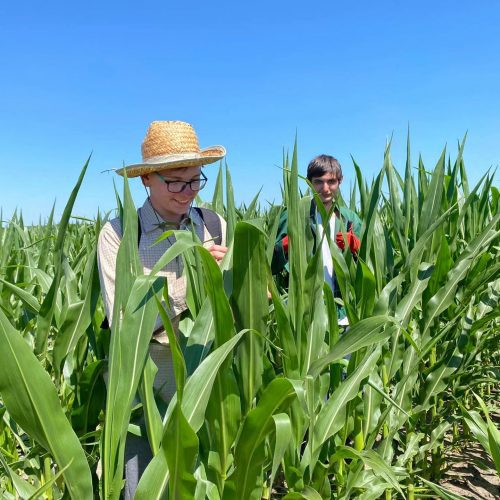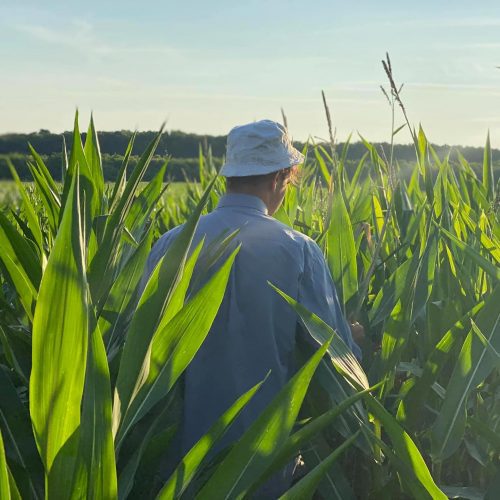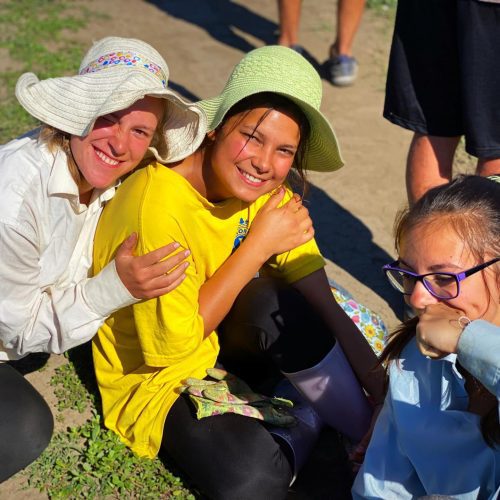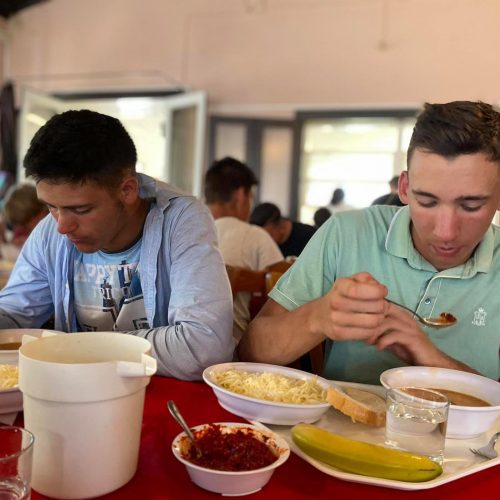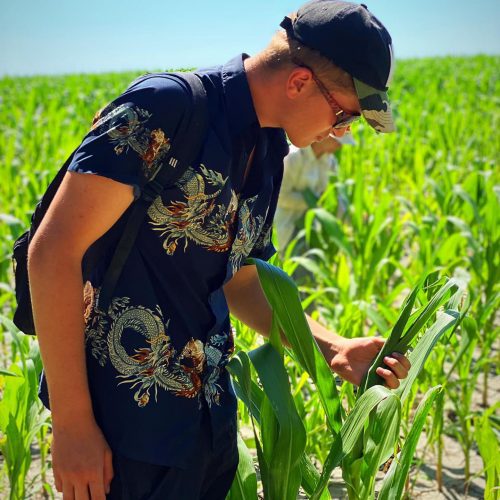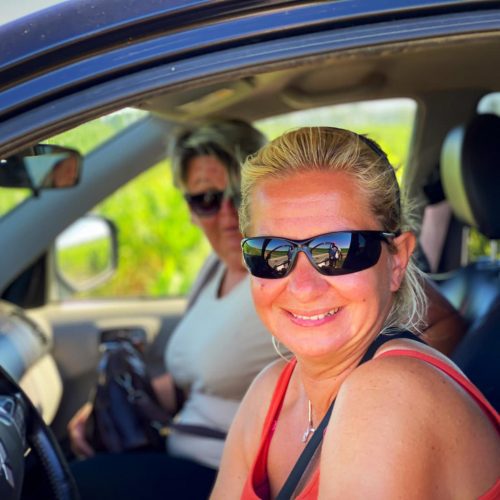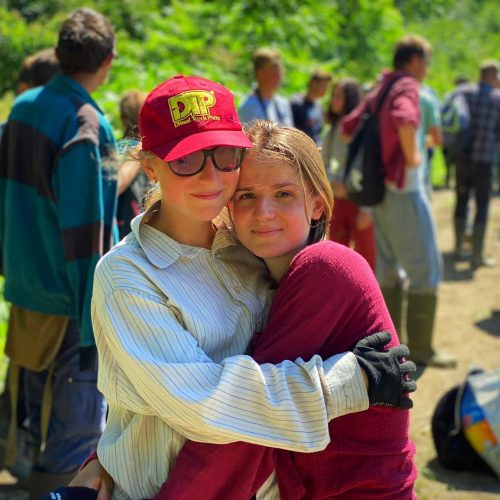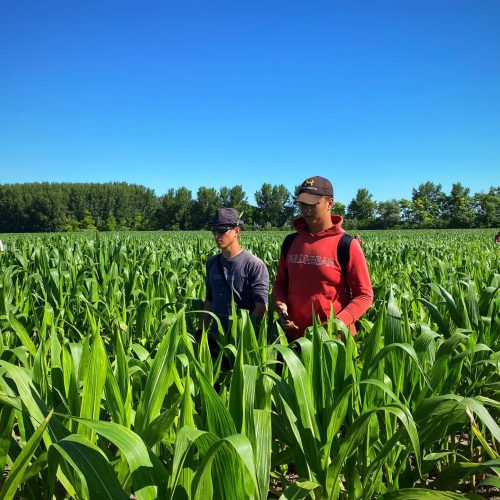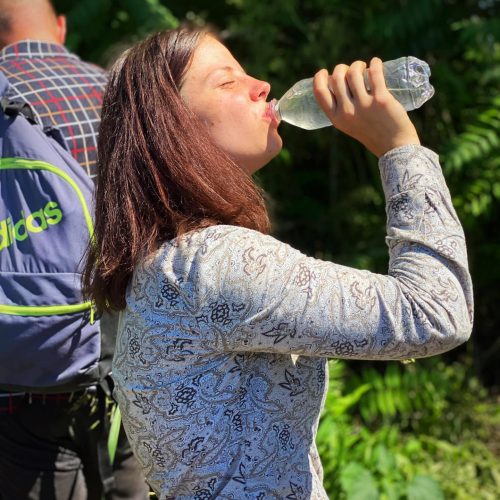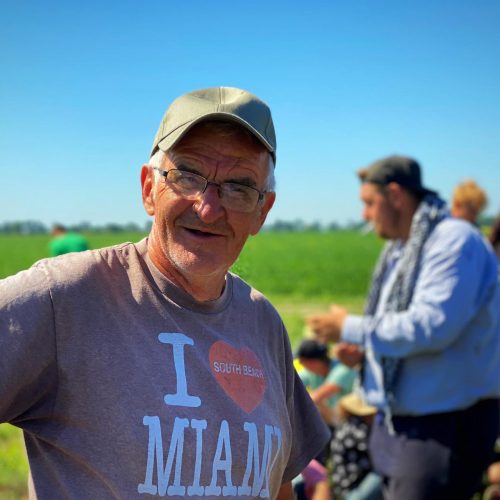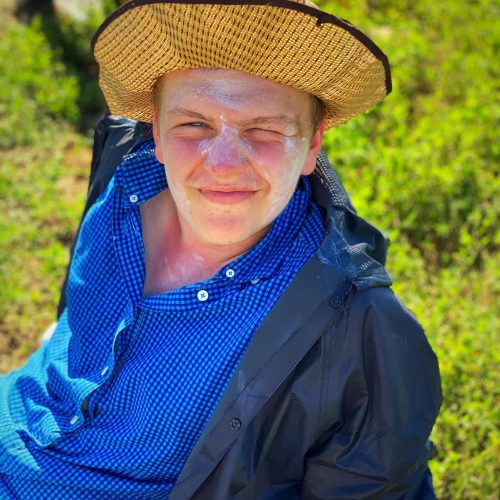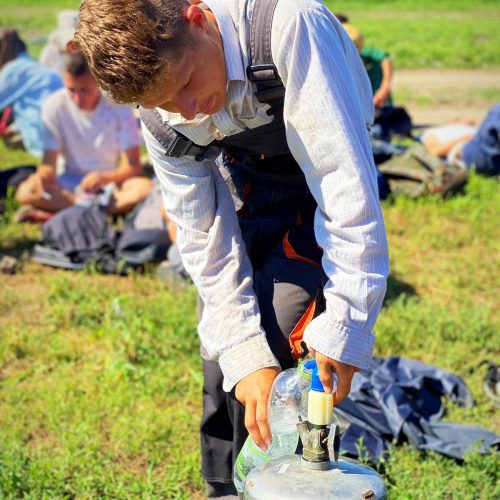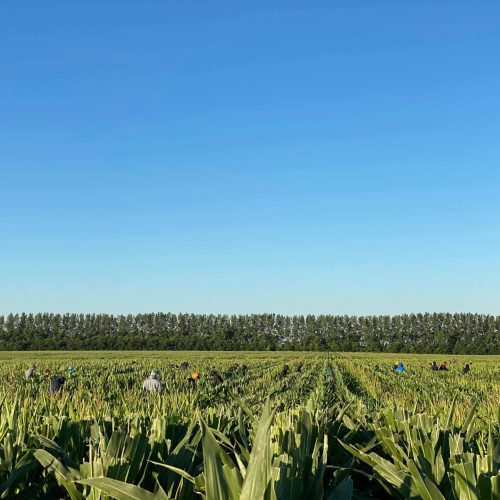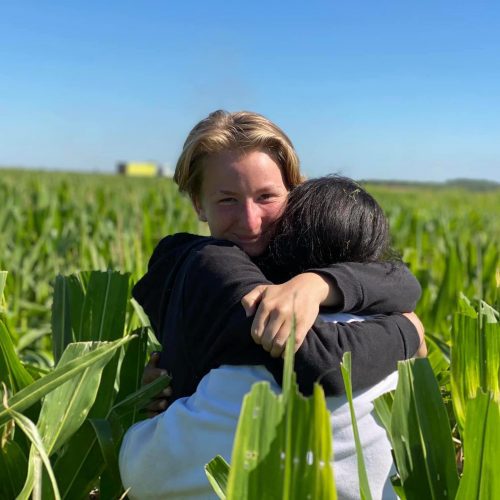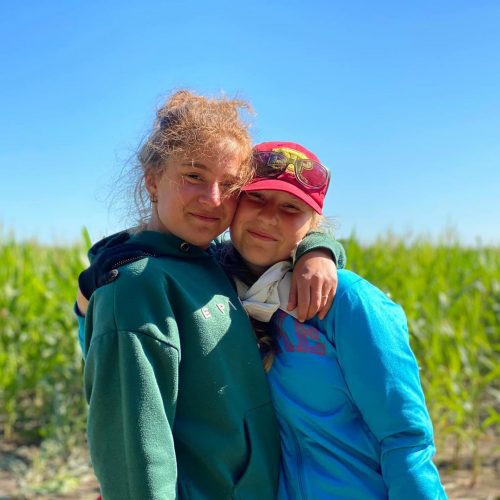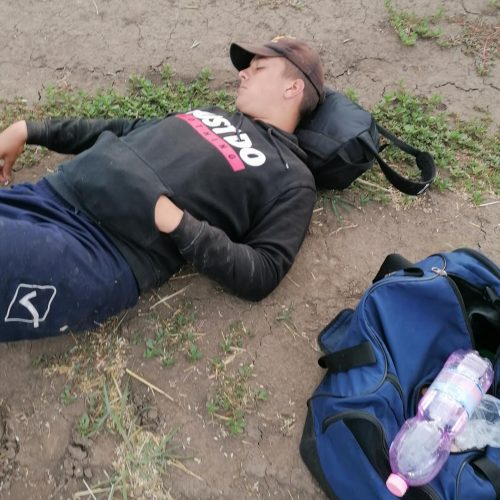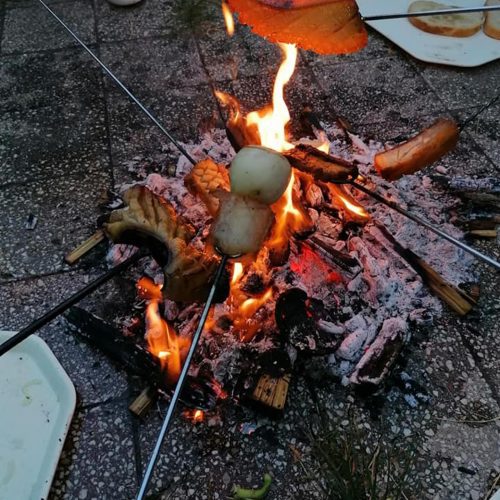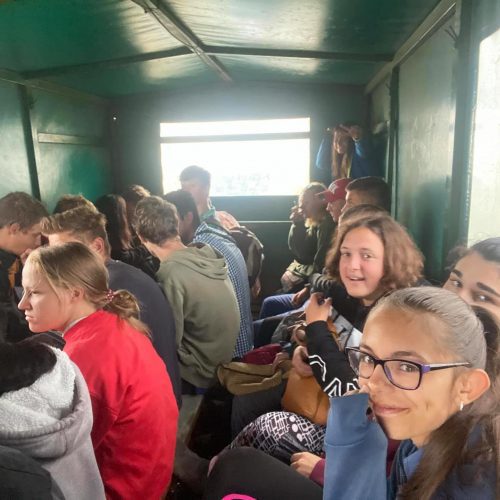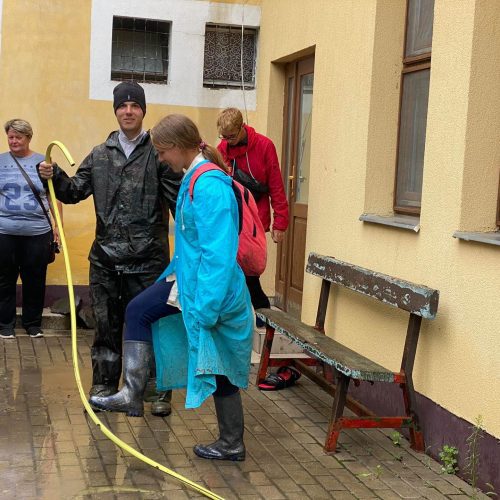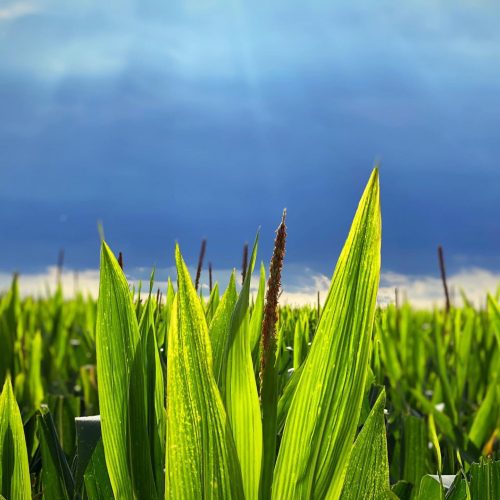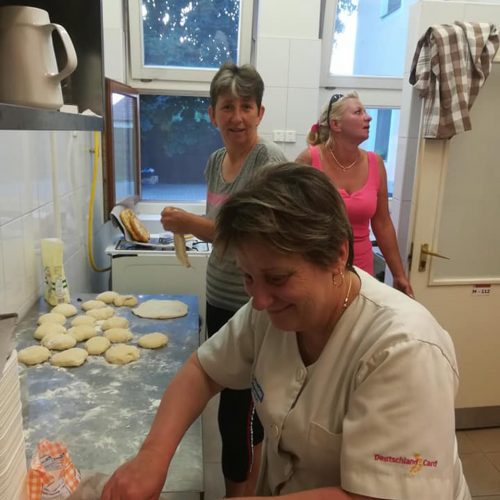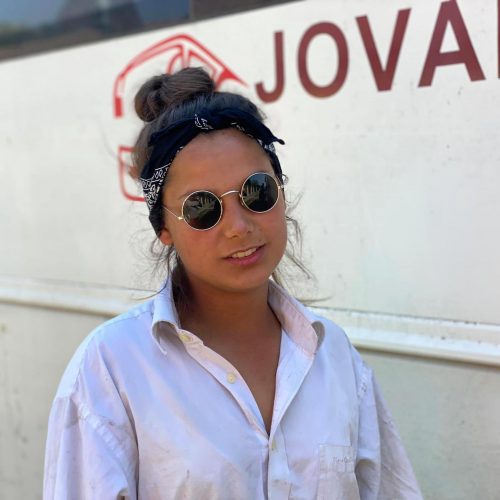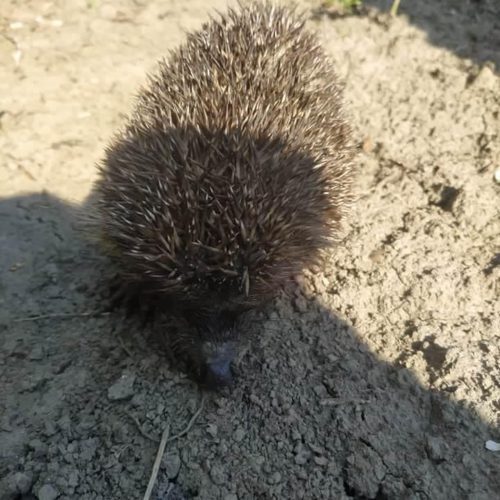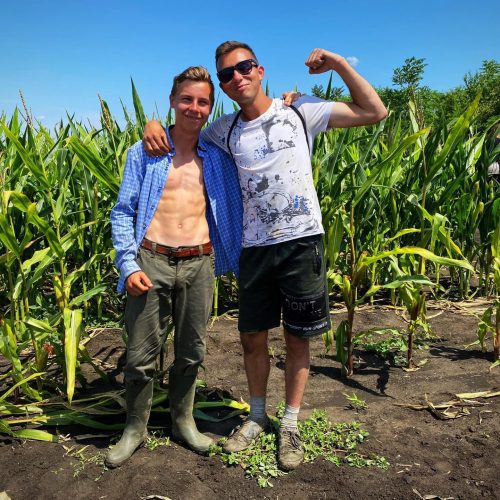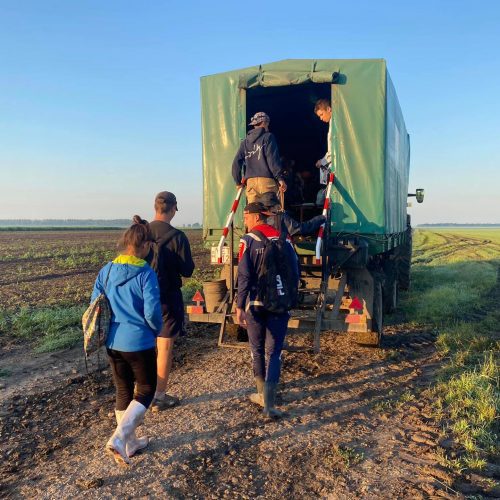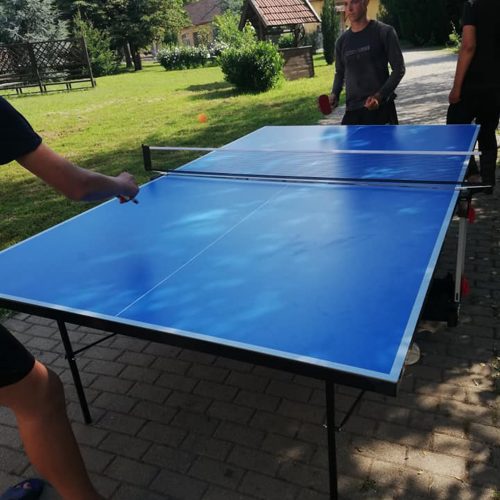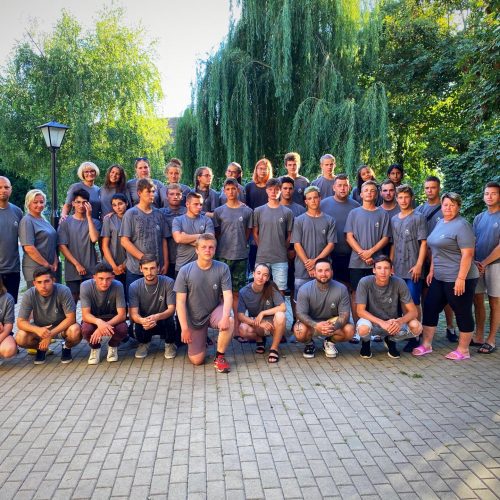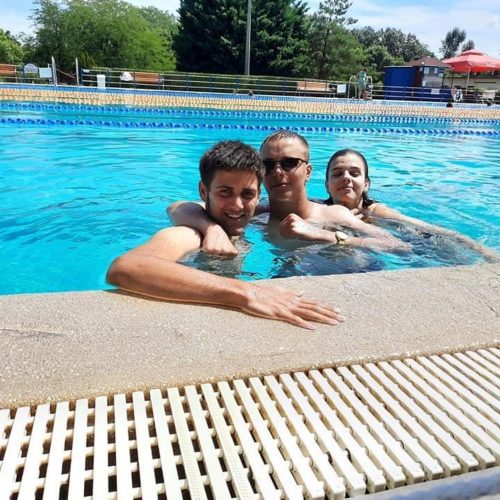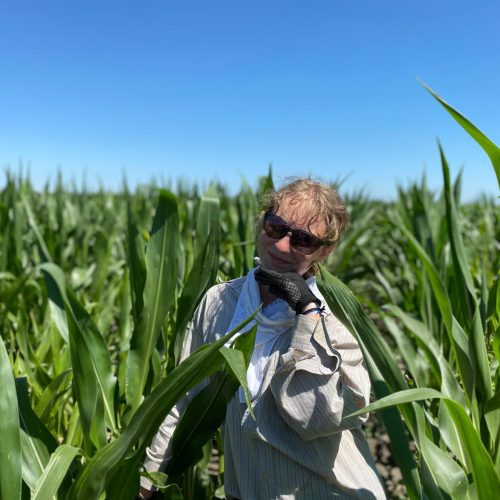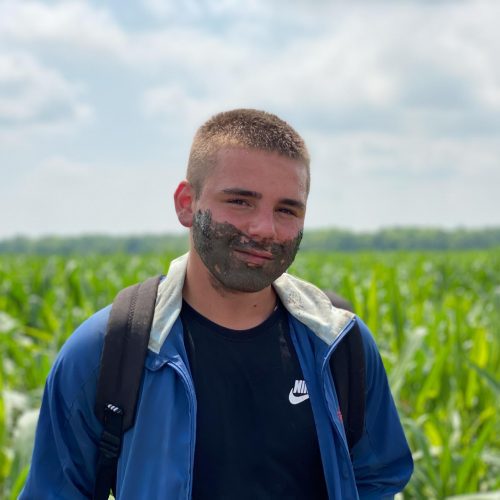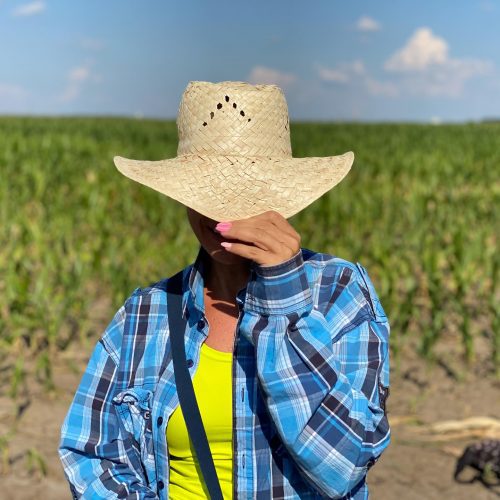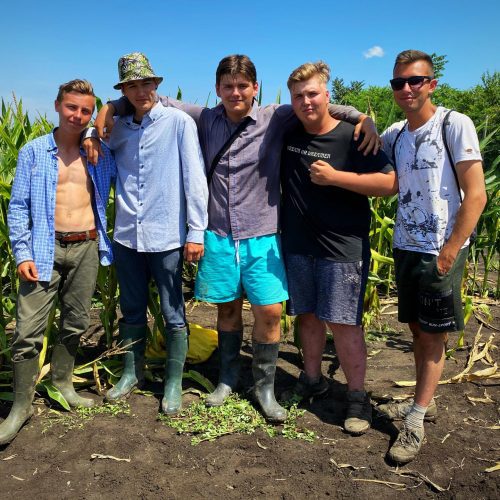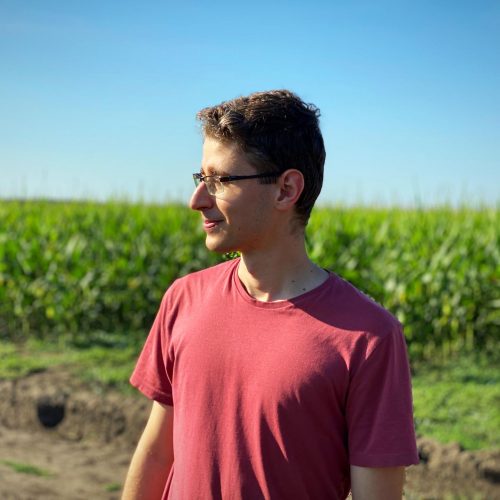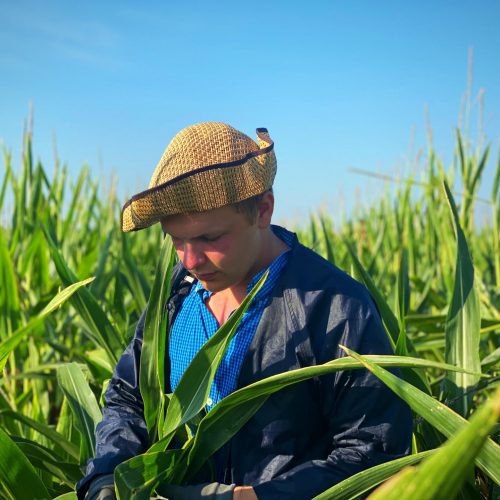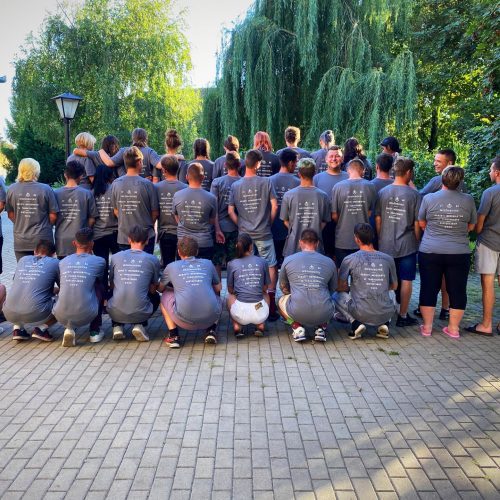Birtok Camp
- Vocational training
- /
- Birtok Camp
Farmers' Camp in Mezőhegyes at the school of the National Stud and Educational Farm

Mezőhegyes, 24 June – 31 July 2024.
If you like good company, a rich leisure programme and a well-paying summer job, and you are over 15 years old, then this is the place for you!
We can accommodate up to 50 students for the 2024 Farmers’ Camp.
We reserve the right to change the programme!
- I. What is detasseling?
- II. This is how you work in the camp
- III. When is the camp?
- IV. Where will my accommodation be and when can I book it?
- V. What will my working hours be like at the camp? What kind of benefits will I receive during the camp?
- VI. How much money can I take home, what kind of contract will the School have with me?
- VII. About the Alpha and Omega Groups Who will lead the groups?
- VIII. What recreational activities can I participate in?
- IX. Registration
I. What is a detasseling?
Maize heading, or simply heading, is one of the most important technological operations in the production of maize hybrid seed, involving the manual or mechanical removal of the male inflorescences of certain maize plants. It is usually carried out by students with appropriate supervision and guidance. The term ‘heading’ is derived from the male flowers of the maize, since it is necessary to remove them during the operation. The actual labelling is preceded by a number of specific technical operations which are not found in conventional maize cultivation, but which are also part of maize labelling in a broad sense. Hybrid maize has now completely replaced conventional varieties in commercial maize production in Hungary, so there is a need for a continuous supply of hybrid seed. The high price of seed makes it possible to carry out labelling, as the process is relatively expensive and would not be feasible at a lower production value.
Biological basis
Maize is a monoecious, monocotyledonous plant, with the fruits and stamens in separate inflorescences (panicle, stalk inflorescence). This unique feature makes the castration of maize a very simple task. It is used only when crossing two breeding lines or ‘varieties’ with different characteristics. In fact, hybrid seed is never produced using varieties, but rather so-called breeding lines, which are subjected to lengthy and detailed breeding trials in the nursery or small plot. Detasseling, i.e. the removal of the label blossom, prevents the plant from pollinating itself, so that the seed of that plant can easily be fertilized by another type of maize (which has not been detasseled).
Pre-titling operations
The detasseling of maize is preceded by various specific and non-specific operations. Non-specialised operations which do not exclusively precede the management of maize crops for seed production. These include soil operations (ploughing, soil preparation), sowing, crop protection, etc. In addition, maize heading is preceded by a number of operations that do not take place in maize crops.
Sowing
Although sowing is a process that is also present in commodity maize stands, the operation is different in seed production fields due to the specific sowing structure. In seed production, the two different types of maize are sown in separate rows, known as the father and mother rows. It is the maize in the mother rows that will be harvested, and it is these plants that need to be germinated. The maize in the father rows is only for pollination, and the crop of these plants is not harvested. The most common field design is a 4:2 (4 mother rows:2 father rows) seeding structure, but there are also different solutions. As with the parent rows, the sub-rows can be sown at a standard row spacing or at a narrowed spacing, which increases the area of the field occupied by the parent rows and thus the amount of seed harvested.
Scraping
The hybrid maize must be kept clean by repeated manual hoeing until the end of the field (20 August). We will be hoeing several times during the camp. Heavy weeds may be a reason for exclusion from seed production and may result in exclusion from the field. Weediness must be kept below the weed level throughout the area when the board is closed.
Access
Alienation is the removal from the field of plants which, because of some abnormal characteristic (height, leaf structure, colour, etc.), are presumed to be genetically different from the predominant plant population on the field. This operation is necessary because, if alien plants remaining in the sire lines pollinate the maize of the parent lines, the genetics of the progeny will not be as they should be. When harvested, the yield of the aliens left in the mother rows will contaminate the seed lot. In the process of alienation, the alien maize should be removed preferably at the root, it is not sufficient to discard them. If a small stump is left above the soil, it can resprout in a few days under favourable weather conditions, and fully regenerate after 1-2 weeks.
Staking, levelling
The so-called stover shoots of the maize are removed during the basting process. These are shoots that grow out of the bottom of the plant for various reasons (damage, excess nutrients) and do not produce an economically valuable crop, so their presence in the stand is undesirable because they deprive the stand of nutrients, compete for light and water and, by increasing the stand density, significantly reduce the clarity of the rows. The removal of such bastions should be carried out in such a way that no stumps are left behind, so as to avoid the resprouting of the bastions. The susceptibility of maize to bastardisation is strongly dependent on its genetic characteristics and the nutrient supply of the field.
Levelling is the removal of individuals (usually lower) that are significantly different from the height of the maize stand (higher maize is removed during the ginning process). It is necessary because during ginning, the ginner’s eye and the ginning machine pass over low-lying maize without removing the label. However, such small cobs are just as capable of producing pollen as larger ones, so they can contaminate the crop with their pollen after heading.
Picking and levelling are usually carried out at the same time, as the workers are both inspecting the lower level of the vegetation.
II. How to work in maize?
The group leaders will explain and show you exactly what to do on the spot. Do not break the corn’s crest, as it will blossom. You have to pull it out without tearing it. After a rainy, humid evening, you must be particularly careful not to let it slip out of your hand, as it can easily cut it. The corn can grow up to 2 metres tall – depending on the variety – so if you’re shorter, you’ll have a harder time. Pollen gets in your face when you’re working – especially when the wind blows, which is hard to avoid – so if you’re allergic, you shouldn’t do this kind of work. The work must be completed within a set time limit, and the group leaders will set the expected performance based on the age and physical abilities of the children. Precision is more important than performance! Do not leave in or break the banner (even a few stems per acre can be a problem). You have to be very careful, because a crest that has not yet grown is like a small leaf that is very easy to miss. There is a good reason for organising a post-titling. Some people carry two lines at the same time, using the right hand for the right line and the left hand for the left line, because they have to walk half as far. But if you move wrongly, and do not pull out the binder but break the corn, three such wrong moves can ruin the whole day’s work, because the broken plants will no longer grow.
The greatest enemy of the binder is heat. It is very hot in the cornfield. Indeed, in recent years it has been very hot in summer, up to 36-38℃, which feels even hotter in maize where the wind is not blowing. Out in the field there is no shade, you can only cool off a bit in a wooded lane at the end of long, even several kilometre long, rows. The leaves of the corn bruise and scratch the skin of the banner, the tiny wounds and scratches start to sting with sweat, dust and pollen get in, which can be very unpleasant. Whatever the heat, it is advisable to wear long-sleeved shirts, long trousers and closed shoes to protect yourself from the strong sun, corn leaves and dust. High-factor sunscreens, straw hats, baseball caps, scarves and sunglasses are also needed to protect against strong sun. Some people even wear a scarf over their face. Bring drinking water, soft drinks and some snacks!
Of course, there is a good side to the job. If you walk with your friends, you can talk, if you walk alone you can listen to music. The company is usually very good, and many lasting friendships have been made in the heraldry camps, and many people have met the love of their lives in the cornfields. If the weather is good – you don’t have to work in sweltering heat or pouring rain and mud – it’s not so stressful to get the job done. The high hourly rate comes with cosy accommodation in a picturesque setting, a delicious and hearty breakfast, hot lunch and hot dinner, and a variety of quality leisure activities after work and on days off.
III. When is the camp?
The main heading period starts on 20 June, but you can also hoe and weed the corn twice as early as the beginning of June. The camp starts ten days after the end of the school term. On Monday, 24 June, the labelling starts and, together with the follow-up work, the Farmers’ Camp will last until 31 July (Wednesday). There will be a summer internship for technical and vocational students; many will be working on the family farm or elsewhere, and of course you’ll need to rest during the summer – so we’ll allow you to work only on the weeks you designate. Once you have registered, a member of staff will contact all applicants by telephone and requests will be recorded.
As we can accommodate a maximum of 50 applicants for the camp, preference will be given to applicants who can stay with us from the beginning to the end of the camp and who can commit to weekend work! Our school and its owner, the National Stud and Educational Farm, organise the summer internships in such a way that they do not affect the duration of the camp, so both vocational school and technical school students are welcome to apply, provided they meet the other requirements. Students from Mezőhegyes have priority in the application process.
IV. Where will my accommodation be and when can I book it?
Accommodation will be provided in our fully refurbished 150-bed dormitory at the Institute’s headquarters, in double, triple and quadruple rooms. All rooms have a bathroom. Boys and girls will also stay in separate rooms on each floor. Campers will have a kitchenette on each floor, a TV in the lounge and free internet access (Wi-Fi). We will provide laundry service for working clothes and bed linen. You can book your accommodation from 16.00 on the day before the camp starts, Sunday 23 June. You must arrive at the headquarters of the Mezőhegyes Technical, Vocational School and Dormatory.
A. What will be my working hours at the camp? What kind of care will I receive during the camp?
The Birtok camp is a residential student camp, which means that campers are required to eat and sleep in the dormitory – even if they are residents of Mezőhegyes, so they won’t miss their morning work. Campers are transported to the work site by bus every day. The children eat breakfast in the dormitory canteen and work starts at 06.00. Lunch is also provided and of course mineral water is always available. At 12.30 pm there will be a one hour lunch break, the buses will take the campers back to the dormitory where they can have their lunch. From 13.30 until 15.30, work will continue and the buses will take the campers back to their accommodation. Estimated time of arrival: 15.45. Dinner is served every day after 18.00 in the dining room of the college. In the event of exceptional weather conditions (heatwave, storm, heavy rain), the working schedule may be changed. In hot weather, for example, it is customary to start work early in the morning or to take a longer lunch break to avoid having to work in the heat of the day. Catering, room allocation and participation in leisure activities will be re-planned each week, as the two days off are often spent travelling home, and students from Mezőhegyes do not sleep in the dormitory; exceptional weather conditions may affect our plans.
The law allows you to work five days a week, eight hours a day on working days, followed by two days off.
VI. How much money can I take home, what kind of contract does the School have with me?
You will be paid a net wage of 10.000 HUF/day for eight hours of work per day, which you will receive in full (without deductions). This means that you can earn 50,000 HUF a week and 350,000 HUF for the whole duration of the camp – 35 days of work. Your wages for the work you do will be transferred weekly to your bank account (or the bank account of your legal parent/guardian). We can only pay you for eight hours of work done to a satisfactory standard and with sufficient performance.
We cannot, for example, count half days, provide sick pay, etc. The School will contract you as a casual worker for the duration of the camp, which can be done from the age of 15 with the consent of a parent/guardian. A medical examination is not required for this type of employment, and campers will receive training in occupational health and safety before starting work. You will be required to sign a report to that effect and a declaration (form) that you do not have any communicable diseases or hidden serious illnesses or allergies that would prevent you from doing the work.
Important: accommodation (including on days off) and four meals a day (including on days off) are provided free of charge on top of your salary, as is participation in leisure activities!
Calories are needed to do the hard work, so we provide a hearty breakfast, snack, hot lunch and dinner every day.
VII About the Alpha and Omega Groups
Work must continue at the weekends, so we have two groups of campers: Alpha Groups work from Tuesday to Saturday (resting on Sunday and Monday), while Omega Groups work from Sunday to Thursday (resting on Friday and Saturday). This is the fairest way to organise the groups, as everyone has a weekend and a weekday off. There are 25 people in two Alpha Groups and 25 people in two Omega Groups. We will try to take into account who would like to work in which group when you apply, you can let our colleague know by phone after registration. Of course, meals, accommodation and leisure activities are provided to members of Alpha and Omega Groups equally on all working days and days off.
The groups are led by teachers and School staff, and the group leaders supervise the children at night and during free time activities. Our policy is to strictly observe and enforce the rules of student work with everyone.
VIII. What recreational activities can I participate in?
The School and the Stud Farm offer a wide range of leisure activities. This is how we reward hard work and perseverance! The sessions are run by instructors and professionals from the stud farm, in strict compliance with the relevant legal and accident prevention regulations.
A taste of the planned programme:
- retro video game tournaments (quartz games, Mattel Electronics Intellivision, Commodore 64, VideoTon TV game, Amiga 600, PlayStation I and II, Xbox One, etc.) and craft activities in the Local History Collection and at the School’s headquarters
- participation in equestrian events organised by the National Stud and Educational Farm
- museum visits – 14 exhibitions in the Carriage Museum and the Local History Collection
- visits to the National Stud and Educational Farm 11. majori cattle farm
- excursion to the Vásárhelyi-Bréda Castle in Lőkösháza, visit of the building
- karaoke evenings
- visit to the seed processing plant of the National Stud and Educational Farm
- cycling tours in the picturesque countryside of Mezőhegyes
- professional excursion to the 20th Major stud farm
- guided walk through the historic monuments of Mezőhegyes
- visit to the Fekete-koi Garden Pond and Irrigation Centre
- swimming in the Rózsa Baths in Tótkomlós and in the Orosháza-Gyopáros Baths
- visits to stud farms, horse riding, carriage rides
- sports facilities, gym, ping-pong, table football
- fencing, archery with Hungarian recoil bow
- demonstration of agricultural machinery, tractor driving
- concerts
- baking of scones, bacon and pancakes
We reserve the right to change the programme!
Participation is free for all camp participants! Participation is optional, not compulsory. Campers who join us only for the first half of the camp or only for the second half of the camp will not be able to participate in all the programs, as many of the organized programs are date specific. Students enrolled in the camp are subject to the provisions of the School’s Rules and Regulations in force during the camp. In the event of serious breaches of the School’s Rules of Procedure, the group leaders may exclude the student from the recreational programmes and, in the case of extremely serious offences, from the camp, with immediate termination of the employment contract.
The Policy is available on the School’s website under “Documents/Documents” or can be downloaded by clicking on the button below:
IX Registration
Registration is subject to prior registration.
You can fill in the registration form quickly and easily online. You can find it on our website, on the School’s Facebook page, or at the link below.
The registration area closed on 27 May 2024, the advertised number of students has been filled.
We reserve the right to change the programme!
For more information about the camp and the detaaselling, as well as regular updates, please visit our website and Facebook page.
https://www.facebook.com/mezohegyes.szakkepzes
You can ask your questions via e-mail, on Facebook or by phone at +36-30-424-4742 to Adrienn Fekete, Assistant Director, Camp Manager.
Spend the summer in a useful and meaningful way! Join us, we look forward to seeing you!
Photo Gallery
Szöveg: Tarkó Gábor igazgató
Fotó: Birtoktábor 2020 – Pintér Gábor referens; „Címerezőtáborban (1970)” – Helytörténeti Gyűjtemény, Mezőhegyes fotóarchívuma, Nórándt Péter gyűjtése


